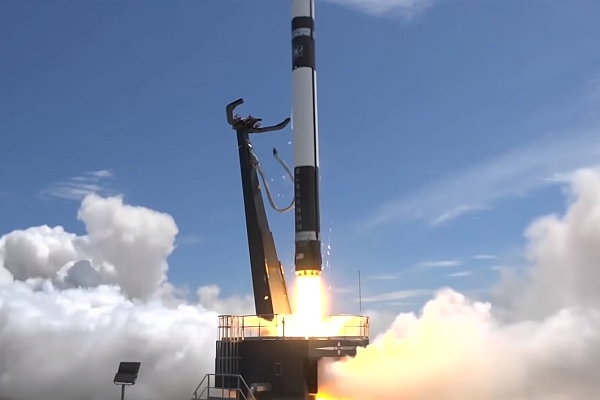Published on the 16/11/2018 | Written by Pat Pilcher

Successful commercial launch is the ultimate combination of technology and business…
If 10 years ago, someone had told me New Zealand would be launching satellites into orbit, I’d have howled with laughter.
This week, however, the Kiwi space industry became a real deal as Rocket Lab celebrated its successful maiden fully commercial launch of six satellites and a technology demonstrator into low earth orbit.
The launch from the Mahia peninsula saw the 18-metre tall Electron rocket lifting off with a hiss and a roar to execute a flawless launch for the ‘It’s Business Time’ mission.
“This technology will really open space for business.”
When the Rutherford rocket engine ignites, its thrust (and the launch pad) are deluged by water jets to protect the launch pad and reduce launch noise. Because of this, there is a colossal amount of steam. Once thrust levels were confirmed, Electron was released from the launchpad for lift off.
In under a minute, the launch rocket had climbed to a commercial airliner’s cruising altitude and moving at the 27,000km/h needed to achieve orbit.
I’m no space nerd (or wasn’t) but watching the live-streamed launch had me yelling “Go you good thing!!!” as Electron blasted its way into orbit.
It was a momentous occasion in New Zealand’s history, but competing with the Armistice Day 100th celebrations and a much anticipated England vs All Blacks test match at Twickenham, mainstream TV News media shunned coverage.
Spectacle aside, the big question is where to from here?
Now that Rocket Lab has achieved a successful commercial launch, the mission’s tag line is the focus as its financial backers seek a return on their investment.
Talking to Stuff after the launch, CEO Peter Beck was effusive about what the launch means for commercial development of space.
“In a few weeks’ time we hope to put another vehicle on the pad – that’s for our very high profile Nasa mission, so we’re taking those payloads to orbit for Nasa,” he said.
“If we can put another one on the pad in a few week’s time, I can’t even think of words to describe that – that is a crazy thing.”
Rocket Lab claim they can get a 150 kg satellite into orbit for a mere US$5.7 million, which in space industry terms is peanuts. The market isn’t small either. Over the next four years, there is a projected demand for 2,600 satellite launches, with many of these small enough to hitch a ride aboard a Rocket Lab rocket. At the going rate, there’s billions worth of business to share around.
“Every detail of the Rocket Lab launch system has been designed to provide small satellites with rapid and reliable access to space,” Beck said.
Rocket Lab founder Beck is a native of Invercargill. In true Kiwi fashion, he is self-taught and doesn’t have a university degree. He originally got a tool-making apprenticeship at Fisher & Paykel, eventually moving to Industrial Research Ltd (IRL) where he was involved in many precision engineering projects.
Rocket Lab’s innovative 3D printed engine design saw them attracting the attention of US investors. They gained the backing of Silicon Valley venture capitalist Vinod Khosla and moved their company registration from NZ to the US, opening corporate headquarters in Huntington Beach, California. US military and aerospace player Lockheed Martin and several other large players have also invested in Rocket Lab who now employ over 200 staff between their US and New Zealand operations (with the lion’s share located at the company’s new HQ in a 7,500 m2 production facility and mission control base in Mt Wellington).
Rocket Lab has scheduled a launch every month for the next two years driven by strong commercial demand. Beck has been quoted as saying that Rocket Lab can manage up to 50 Electron launches annually (which is roughly double that of what is currently happening in the US market) and that this number is set to grow once international launch sites in the US and Asia come online.
“The innovation behind Electron will release the limitations on launching small satellites. Our vision at Rocket Lab is to make space commercially viable and more accessible than ever, doing what the Ford Model T did for consumer automobiles. This technology will really open space for business.”
According to Beck, the potential spin-offs are huge. “Along with benefits for commercial enterprises, cheaper and faster space access has the potential to lead to more accurate weather prediction, global high-speed Internet access, as well as real-time monitoring of the impacts of human development.”
Those spin-offs are clearly winning fans, with Rocket Lab announcing this week that it has secured an additional US$140 million in Series E financing, taking its funding to date to more than US$288 million and taking the company past its previous $1 billion-plus valuation.
The financing, which closed before Sunday’s mission, was lead by existing backers Future Fund – Australia’s Sovereign Wealth Fund and saw New Zealand’s ACC join the funding push. Earlier investors including Khosla Ventures, K1W1 and Bessemer Venture Partners also showed their continued faith in the company.
Rocket Lab says the new funding will support an ‘aggressive’ scaling up of Electron production, along with new launch sites and three new major – unspecified – R&D projects.



























